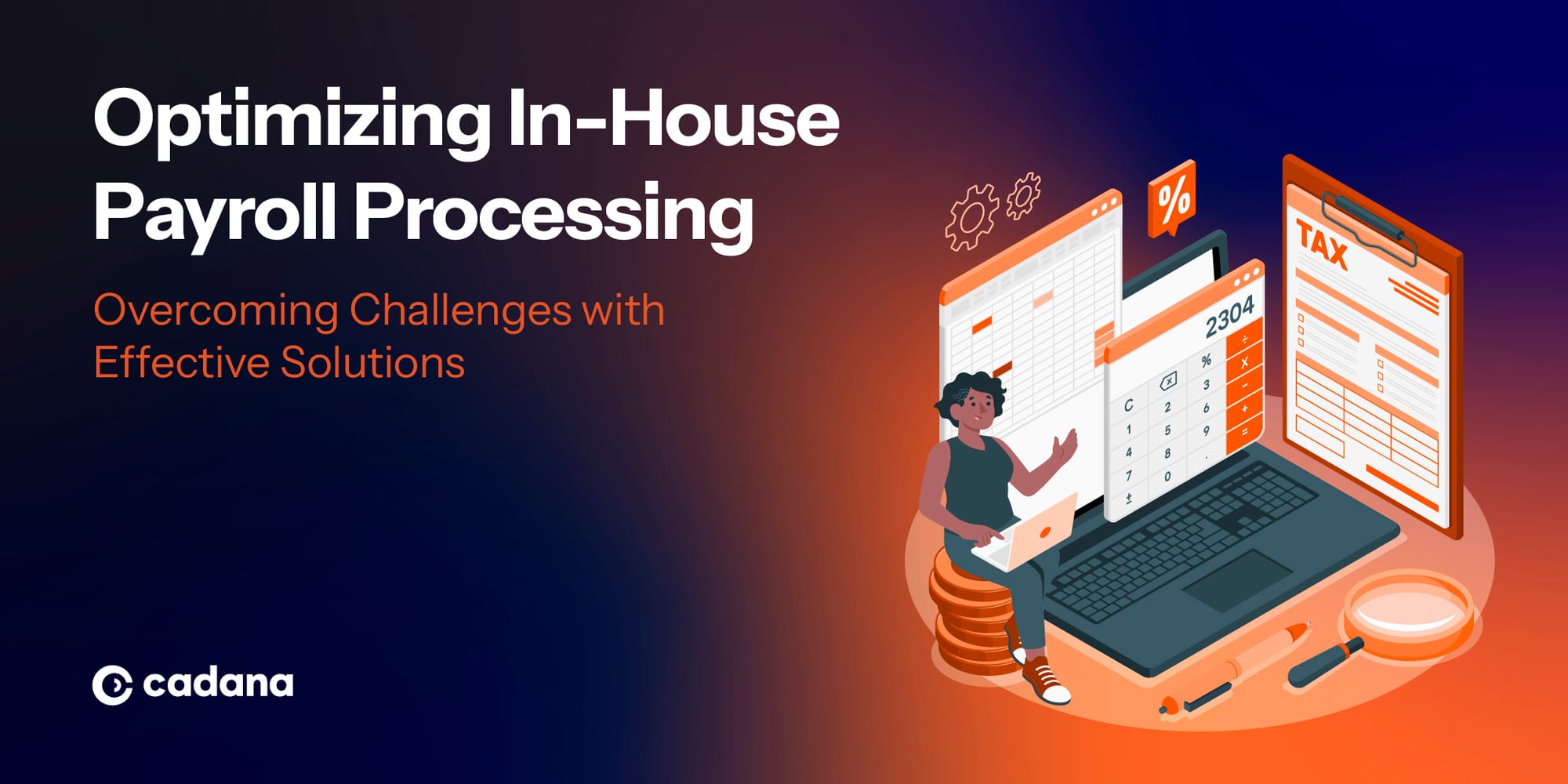Optimizing In-House Payroll Processing: Overcoming Challenges with Effective Solutions

Payroll processing in-house can be quite a chore, especially for larger organizations with complex structuring and many employees. It’s worth noting that about 59% of employees say salary is the main factor that contributes to feeling fulfilled in their career. It may be cost-effective at face value, but in more ways than one, this in-house payroll processing spells disaster for satisfaction, compliance, and operational functions. In this article, we look at the common challenges most businesses face when carrying out in-house payroll processing and some practical ways out.
Problem 1: Knowledge Gaps (And the Fear of Audits)
Tax laws, changing deductions, and compliance requirements can create a sense of uncertainty and fear among payroll administrators. This lack of knowledge can lead to errors, which can result in costly penalties and audits.
Recommendation:
A practical solution is to outsource payroll to a reputable third-party platform. Such platforms have specialized knowledge in tax laws, deductions, and compliance requirements. They stay updated with regulatory changes, thus reducing the risk of errors and costly penalties. Leveraging their expertise ensures compliance and reduces the risk of audits.
Problem 2: Tech Trouble (Spreadsheets Aren't Your Friend)
Using manual tools for in-house payroll processing is a recipe for trouble. Typos, missed deadlines, and version control chaos await!
Recommendation:
Manual tools like spreadsheets are prone to errors and inefficiencies. Transition to a white-label payroll management platform that offers automated solutions. These platforms provide accurate calculations, deadline reminders, and centralized data management, eliminating the chaos associated with version control and manual entry.
Problem 3: The Time Suck
Do you spend hours on the payroll when you should be focusing on running your business? That’s a classic sign in-house payroll processing is dragging you down.
Recommendation:
If payroll processing consumes valuable time that could be better spent on core business activities, it's time to consider outsourcing. Third-party payroll providers handle the administrative burden, allowing you to focus on strategic business growth and operations. This shift frees up your time and resources, enhancing overall productivity.
Problem 4: Incorrect Employee Information
Managing a payroll database with correct employee information is crucial to ensure that your employees get paid accurately and on time.
Recommendation:
Maintaining accurate employee information is critical for timely and correct payments. White-label payroll solutions offer robust databases and validation processes to ensure data accuracy. These platforms can integrate with your existing HR systems, minimizing discrepancies and ensuring your employees receive accurate payments.
Problem 5: Late or Inaccurate Payments
Payroll processing is essential in workforce management and must be done accurately and promptly. If you fail to pay your workers on time, salary delay can potentially lead to dissatisfaction and cash flow issues for employees.
Recommendation:
Late or inaccurate payments can lead to employee dissatisfaction and financial issues. Third-party payroll providers guarantee timely and precise payroll processing. Their automated systems reduce the risk of delays and errors, ensuring your workforce is paid correctly and on time, which helps maintain employee morale and trust.
Problem 6: Compliance and Regulatory
Issues Staying compliant with the law and running the company within the prescribed legal framework is crucial. Keeping in sync with the latest labor laws, state regulations, and regulatory requirements can be challenging for any business.
Recommendation:
Keeping up with labor laws, state regulations, and compliance requirements is challenging. Outsourcing to a white-label payroll provider ensures adherence to the latest legal frameworks. These providers continuously monitor regulatory changes and adjust payroll processes accordingly, helping your business stay compliant and avoid legal complications.
Problem 7: Limited Expertise and Advisory Support
In-house payroll teams may lack the specialized expertise needed to navigate complex payroll scenarios. Outsourced payroll providers, on the other hand, offer valuable advisory support and are well-versed in the intricacies of payroll, ensuring accuracy and compliance.
Recommendation:
In-house payroll teams may lack the specialized expertise needed for complex payroll scenarios. White-label payroll providers offer advisory support and are well-versed in payroll intricacies. Their expert guidance ensures accuracy, compliance, and efficient handling of complex payroll situations, providing peace of mind and reliable support.
Problem 8: Data Security and Confidentiality Concerns
Protecting sensitive payroll data is crucial for any business. In-house payroll processing raises concerns about data security and confidentiality. Without robust data protection measures, your business could be vulnerable to data breaches and compliance violations.
Recommendation:
Protecting sensitive payroll data is paramount. Third-party payroll providers implement robust security measures, such as encryption, secure data storage, and regular security audits. By outsourcing, you can leverage their advanced security protocols, ensuring your payroll data remains confidential and protected from breaches.
Problem 9: Hidden Costs of In-House Payroll
While managing payroll internally may seem cost-effective at first glance, the hidden costs can add up. These costs include software licenses, training, payroll staff salaries, and the potential expenses associated with errors and compliance issues.
Recommendation:
While in-house payroll might seem cost-effective initially, hidden costs can accumulate. Outsourcing to a white-label payroll provider can be more cost-efficient. They offer transparent pricing, eliminating hidden costs associated with software licenses, training, payroll staff salaries, and potential errors. This approach provides predictable costs and reduces financial risks.
In conclusion, in-house payroll processing can be a complex and challenging task for any organization. By understanding the common challenges and implementing practical solutions, businesses can ensure accurate and timely payroll processing, maintain compliance, and protect sensitive employee data.
